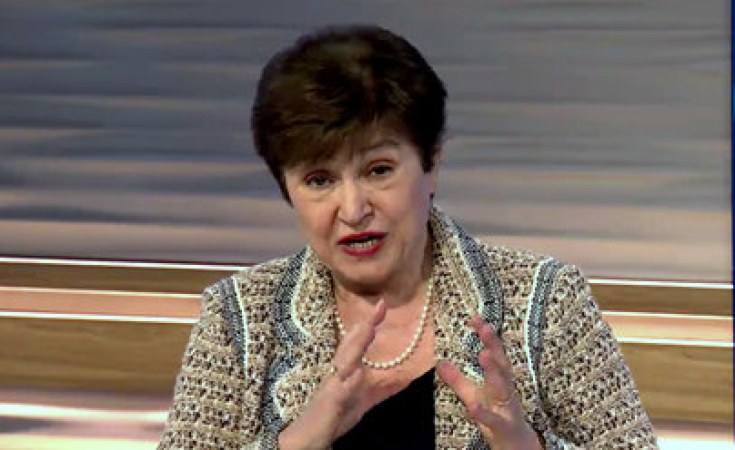African economies, already battling to recover from a Covid-induced recession, face major obstacles as they manage "spillover" effects from the war in Ukraine, IMF Managing Director Kristalina Georgieva told a media roundtable with global reporters on Thursday (March 10, 2022).
This is a crucial time "to find a way to buffer" these struggling economies – a message she said she heard on Wednesday during a meeting with African ministers of finance, central bank governors and representatives from the United Nations Economic Commission for Africa (UNECA) to discuss the impact of the crisis in Ukraine. She listed "four channels" hitting Africa as a result of the war:
- energy price increases
- food price rises
- debt service obligations
- loss of revenue from tourism.
Repercussions from the war in Ukraine are "a real shock" for African economies already reeling from Covid-induced recession.
Answering questions posed by a small panel of journalists from 15 international media outlets, including allAfrica, Georgieva noted that 12 African countries are net energy exporters while 42 are energy importers. "With the limited fiscal space they have, this is a real shock," she said. Fuel prices are rising across the continent. In Nigeria, Africa's largest oil producer, shortages are creating long queues at petrol stations and the cancellation of flights by domestic airlines.
"Quite a number of African countries already see food insecurity on a very large scale - Sudan, Ethiopia, the Horn of Africa region, Georgieva said. "And now food prices are shooting up." She cited the "dramatic" impact on some countries that face the loss of wheat imports from Russia and Ukraine. The World Food Programme reported this week that the east African region will feel the impact of the war in Ukraine on both the price and availability of wheat, which are already under pressure from recurring drought. "Ethiopia, Sudan and South Sudan are more likely to be affected by possible wheat prices shocks as they are already facing internal socio-economic and climatic shocks - which have already led to high food prices," WFP said in its latest food security analysis. The greatest impact will be felt by the urban poor, "who are already facing skyrocketing food prices and COVID-19 impacts on incomes," WFP said.

Energy & food price rises hit consumers harder in low-income countries across Africa.
"Cost of living expected to rise sharply in many countries as energy & food prices skyrocket," IMF Deputy Managing Director Gita Gopinath said in a Tweet, adding that the of consumption averages 50 percent in Africa, compared with 30 percent worldwide. "Pass through of world prices to prices paid by consumers is also higher" - 50 percent for low-income countries compared with 10 percent for developed economies, she said. "African countries imported agricultural products worth U.S.$4 billion from Russia in 2020," according to an analysis by Wandile Sihlobo, from Stellenbosch University. "About 90% of this was wheat, and 6% was sunflower oil," with Egypt, accounting for nearly half, followed by Sudan, Nigeria, Tanzania, Algeria, Kenya and South Africa.
"Egypt imports nearly 85% of its wheat from Russia and Ukraine, and it is Russia's top African trade partner," Nosmot Gbadamosi reported in Foreign Policy. Other countries, particularly in north Africa, are similarly wheat-reliant on the two countries that are now at war.

"I worry for Egypt," Georgieva said. "If we have a sustained high food and energy prices, how this is going to impact people in Egypt?"
Discussions are ongoing to explore how to mitigate the impact on vulnerable populations and vulnerable businesses.
Asked during the roundtable about Wednesday's meeting with African ministers and central bank governors, Georgieva said "many of them are thinking what can we do to put us on a sounder footing? In other words, thankfully there is more appetite for reforms."
African countries could benefit from a new IMF Trust designed to boost resilience in low-income countries.
Adopting reform measures could improve countries' eligibility for IMF programmes like the proposed $50 billion Resilience and Sustainability Trust (RST), designed to assist low-income and vulnerable middle-income countries to boost resilience to balance of payments shocks and promote sustainable recovery.
"Many African countries are interested," she said about the RST. And many are likely to be eligible when the Trust is launched during the IMF/World Bank annual meeting in October. "What I encouraged the ministers yesterday was - work early on your plans so you can benefit from the Trust once it becomes available," she said.
Georgieva concluded the roundtable by stressing the importance of a "global safety net with the Fund at the centre" and regional arrangements in place to buffer economies. "We live in a more shock-prone world, and we need strength of the collective to deal with shocks to come."


